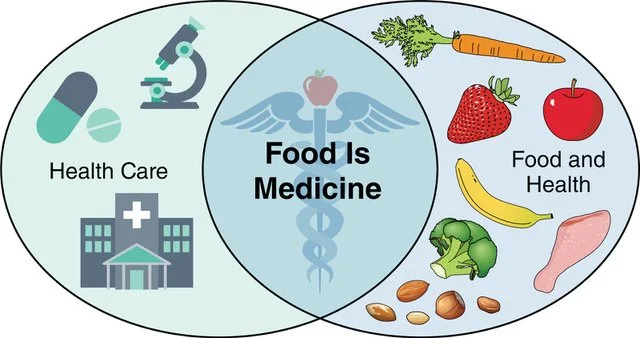Newsletter | Can Food Really Be Medicine?
Ever since limes and sauerkraut were discovered as cures and preventatives for scurvy in the 18th century, food has been leveraged as a powerful tool for preventing disease and advancing health. In the 20th century, supplemented foods - adding iodine to sale, boosting milk with vitamin D, even adding fluoride to public water systems - created huge public health benefits, turning the ubiquity of mass-consumed foodstuffs to prevent common diseases.
These were ingenious adaptations that likely have saved millions of lives and spared many more millions from horrible diseases. And they did it by requiring very little of individual behavior. Citizens live their lives as usual and still benefit.
So we’ve been encouraged by the revitalized interest in “food as medicine” (FAM) - a philosophy to more proactively leverage food for health and wellness goals, on both personal and population levels. We say “philosophy” because FAM is so diffuse and varied, less than a project or a movement but, at its best, more than a fad. On the one hand, food as medicine means making healthy foods more available to disadvantaged communities, from cash programs to subsidized grocery stores. Feeding America is a hallmark program in this area, creating a nationwide network of foodbanks. The nonprofit was recently boosted by a partnership with the US department of Health and Human Services earlier this year.
We also note startups like Season Health, that do for healthy eating what Brightside does for mental health: connect people with true experts (dietitian) who can help clients develop realistic meal plans and diets that help them eat better - and it's usually covered by insurance. This is Food as Medicine at scale with science.
But like anything having to do with food, the marketers are right there, too. Ever since the “health food” vogue of the 1960s and 70s, there have been hustles and hucksters pitching products that will do X, Y, or Z, depending on your desired outcomes. Today, the “healthy food” market is estimated at $940 billion a year - including CHD infused sodas to probiotic peanut butter (and probiotic peanut butter for dogs!). There’s a great recent essay in Vox on this “functional beverage” market here.
As Thomas wrote a few years ago in an essay called “We Don’t Know What to Eat,” “Vitamins, minerals, supplements, low gluten, low carbohydrates, low cholesterol — entire industries have been built on the inclusion and exclusion of certain substances in our diets. Avoiding disease is the general goal here; usually heart disease, with cancers a close second. But peer-reviewed science that connects these various inputs to specific outputs is surprisingly scarce.”
These shifting tides of evidence can make for great business. It has fueled a new flock of self-improvement and self-help gurus who often claim to put science first, while often offering the same cupboard of ideas. The most famous of these are Andrew Huberman and Peter Attia, who both come with Stanford credentials and podcasts and books (Huberman’s - called “Protocols” - comes out next April, in what promises to be a publishing supernova with versions in more than 20 languages).
This new era of FAM treats food as just one more input, along with exercise, medications, and screening test results, that right-minded individuals can manipulate to achieve their goals and optimize their outcomes. Honestly, it’s super-inspiring and motivating, provided you have the wherewithal to pursue your optimal path. Like all self-help, the burden is on the self, not society.
A great deal of this new FAM relies on supplements, just like vitamin C centuries ago or folic acid decades ago. But these days, the supplements business has a more dubious grounding in actual science and efficacy. One "Life Hacks" website lists at least 25 supplements that it suggests Andrew Huberman takes regularly. We don't know if that's true or not, but it sounds exhausting at best.
And do these supplements even work? The science is oh-so-iffy. Hands down the best visualization of the quality of research is this 15-years-long effort by David McAndless at Information is Beautiful.
You can dig deep into the fully interactive version with sources here.
Even putting aside the science, the persistent promise of supplements suggests that there is a path forward from wherever you are, healthwise, to a better version of yourself. But the problem with reducing all life decisions to inputs and outputs is it assumes that we are all just petri dishes in a sterile environment. (And what about the petri dish itself? Who made the petri dish?) Life just doesn’t work that way; we can’t control the infinite number of variables at play in our health, even with something like food.
What do you think? Comments are open below.
Read the full newsletter.



